While the world's attention is focused on the Ukrainian jet tragedy that took 176 innocent lives and Iran's acknowledgement of downing the plane "unintentionally," one should never forget the trigger of the tragedy – the U.S. killed Iran's top general Qasem Soleimani - and Iran at that time was on the edge and ready at every second for an "all-out war" with the U.S.
The U.S.-sanctioned killing of Soleimani has created a new wave of turbulence in the Middle East. Here are three aspects that make it a big deal.
The target: Iran's revolutionary icon
It is not the first time the U.S. carried out an assassination with a drone, nor is it the first time it committed targeted killings. But one must distinguish the act of killing "terrorists," ISIL leader Abu Bakr al-Baghdadi, for example, from killing a senior officer of a legitimate government.
Therefore, the target is the first aspect that makes this sanctioned killing a big deal, as Soleimani was a vital character in Iran's domestic politics with profound influence in the region. Killing such a big influencer would cause severe retaliation from Iran and its allies, and would even put the U.S. at the risk of war.
In Iran's domestic politics, Soleimani, as the commander of Iran's elite Quds Force, was considered as the second most powerful person in Iran after its supreme leader. As Iran's right-hand man, he built Iran's intelligence and military operations abroad and gradually gained popularity both at home and in the region during his decades of fighting against the U.S.
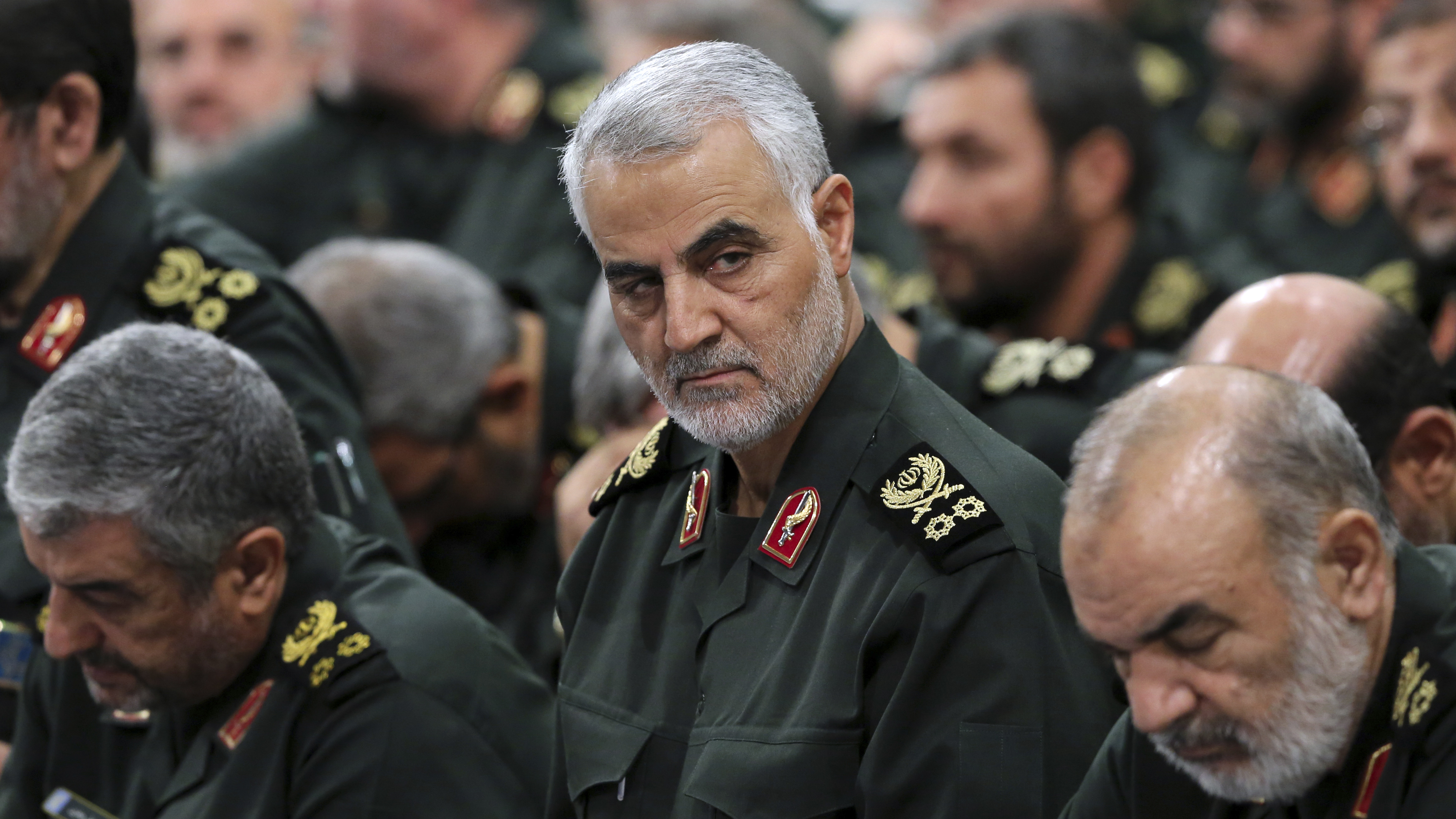
Major General Qasem Soleimani (C), commander of Iran's Quds forces, was killed in a U.S. airstrike. / AP Photo
Major General Qasem Soleimani (C), commander of Iran's Quds forces, was killed in a U.S. airstrike. / AP Photo
Diplomatically, Soleimani was recognized as a linchpin of the Islamic republic's foreign policy who can spread his influence to the region. According to a message sent to U.S. General David Petraeus, Soleimani said he could "control the policy for Iran with respect to Iraq, Lebanon, Gaza and Afghanistan."
Mentally, Soleimani's relentless fighting has also made him a revolutionary icon and a "living martyr of the revolution" for many in the Middle East in the four-decade resistance against the West.
Also, as a famous Shiite representative, the death of Soleimani not only angered Iran but also provoked a storm among all Shiite Muslims, Shiite-led governments headed by Iraq, Syria, Lebanon and numerous Shiite military groups.
Repercussions came quickly after the assassination. On January 5, Shiite representatives in Iraq's parliament passed a non-binding resolution urging the government to end the presence of foreign forces in the country. Soleimani's successor, Esmail Qaani, also promised to follow his predecessor's path and work to "get rid of America from the region."
Hezbollah leader Hassan Nasrallah echoed his sentiments, saying the death of Soleimani would inspire "many more martyrs to blow themselves up."
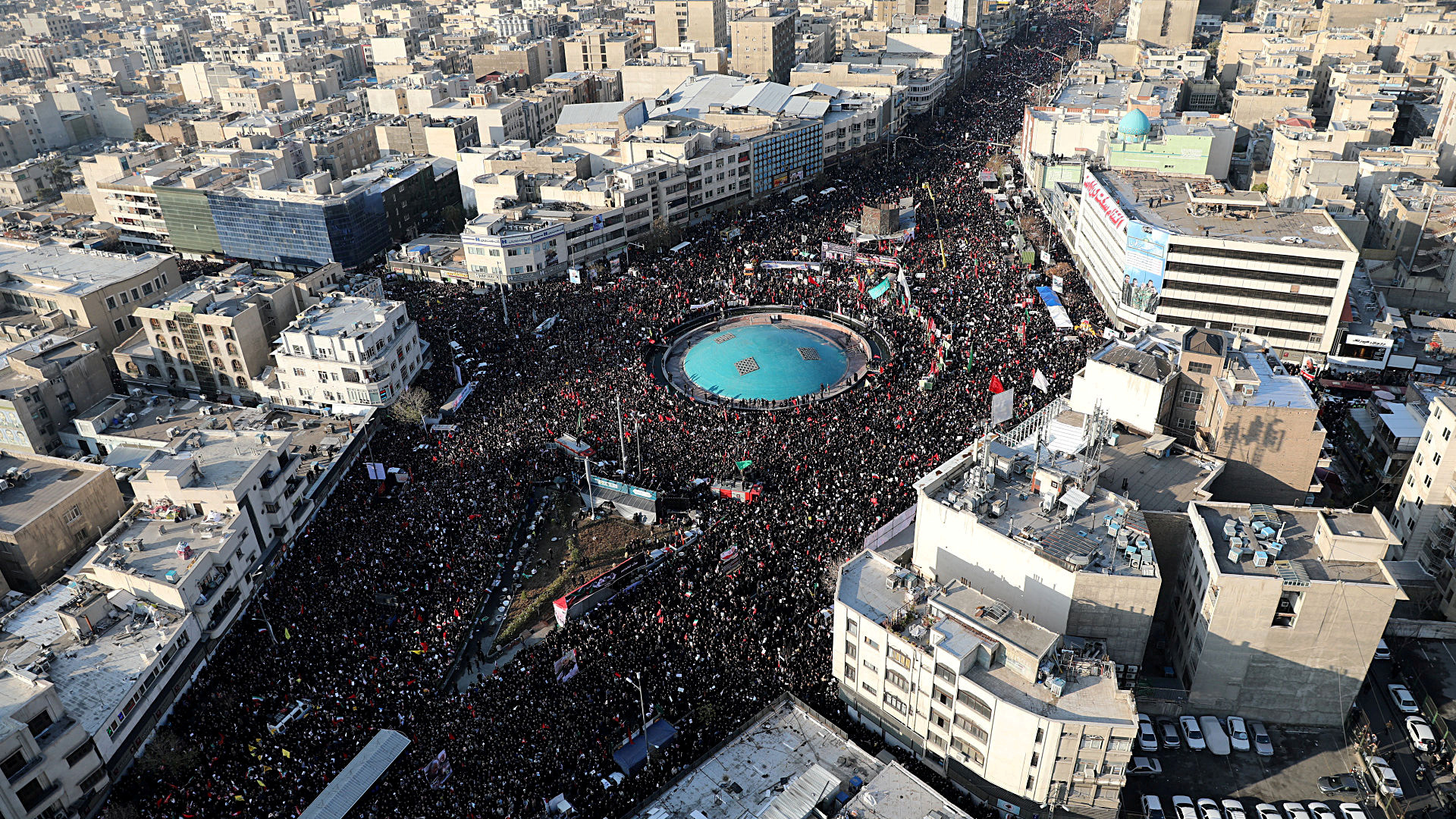
An aerial view of the gathering at the Enqelab Square during the funeral of top Iranian general Qasem Soleimani in Tehran, Iran, January 6, 2020. /Reuters Photo
An aerial view of the gathering at the Enqelab Square during the funeral of top Iranian general Qasem Soleimani in Tehran, Iran, January 6, 2020. /Reuters Photo
The method: A drone assassination
The second aspect is the legality and justification of the killing, which is perhaps also the most controversial issue, as both Iran and Iraq claim that Soleimani's death was a politically motivated "assassination." Many people are concerned that the action may set a precedent and break the bottom line of international order.
Describing the operation as a "defensive response," U.S. Secretary of State Mike Pompeo said the operation was authorized by U.S. President Donald Trump because Soleimani was "plotting imminent attacks" in the region that would put "dozens, if not hundreds of American lives at risk."
Trump confirmed the remarks in an interview with Fox News, adding that he believed Soleimani was going to attack the U.S. embassy in Baghdad without giving further details.
Despite the statement, it does not change the nature of the operation – an airstrike targeting a government official without notifying Congress and Iraq.
"You can't take aim at an official inside a government and say that is not a war," said Karen Greenberg, director of the Center on National Security at Fordham University Law School, adding that the attack could be interpreted as the U.S. declaring war on Iran.
Read more:
Timing of Soleimani killing fuels Trump 'wag the dog' claims
U.S. killing of Iran's Soleimani: How the world is reacting
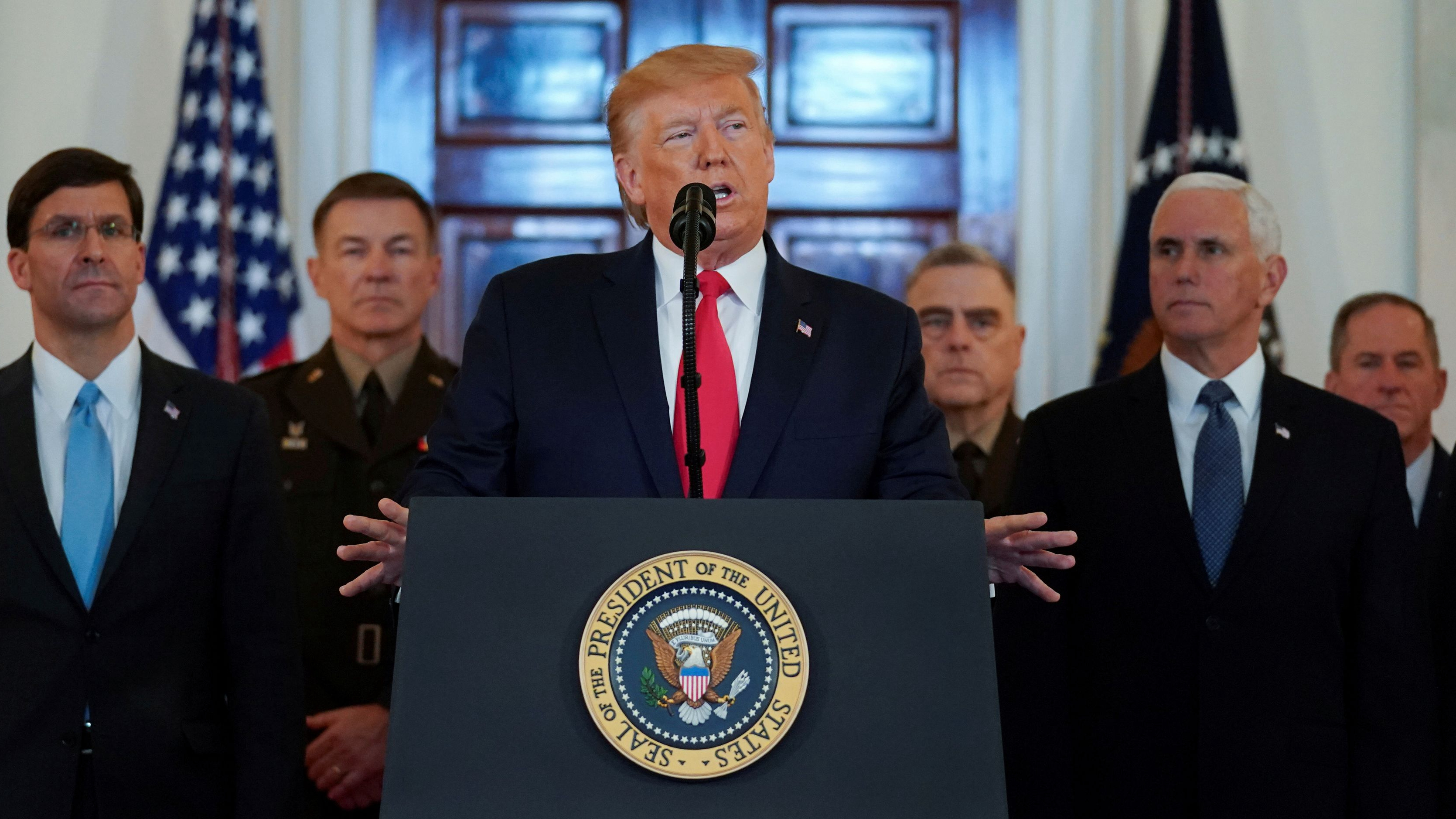
U.S. President Donald Trump delivers a statement about Iran, flanked by U.S. Secretary of Defense Mark Esper (L-1), Vice President Mike Pence (R-2) and military leaders in the Grand Foyer at the White House, Washington, U.S., January 8, 2020. /Reuters Photo
U.S. President Donald Trump delivers a statement about Iran, flanked by U.S. Secretary of Defense Mark Esper (L-1), Vice President Mike Pence (R-2) and military leaders in the Grand Foyer at the White House, Washington, U.S., January 8, 2020. /Reuters Photo
From a legal perspective, targeted killings are permitted under international law in only very narrow circumstances, and the U.S. failed to provide convincing evidence.
Domestically, the U.S. refused to call the action an "assassination" as it is illegal under U.S. federal law since 1981. But to make the strike legal, Article II of the U.S. Constitution stipulates that the U.S. must be facing an "imminent threat," a description that is vague and without precise definition.
The necessity of the operation seems untenable even to U.S. politicians as the Democrats-dominated House passed a resolution on January 9 to stop U.S. President Donald Trump from further military action against Iran, rebuking the president days after he ordered a drone strike that killed Soleimani and raised fears of war.
Regardless of the legality, the attack itself is also striking, as many fear that this relatively economical and convenient way of killing is likely to be emulated by other countries and even terrorist groups.
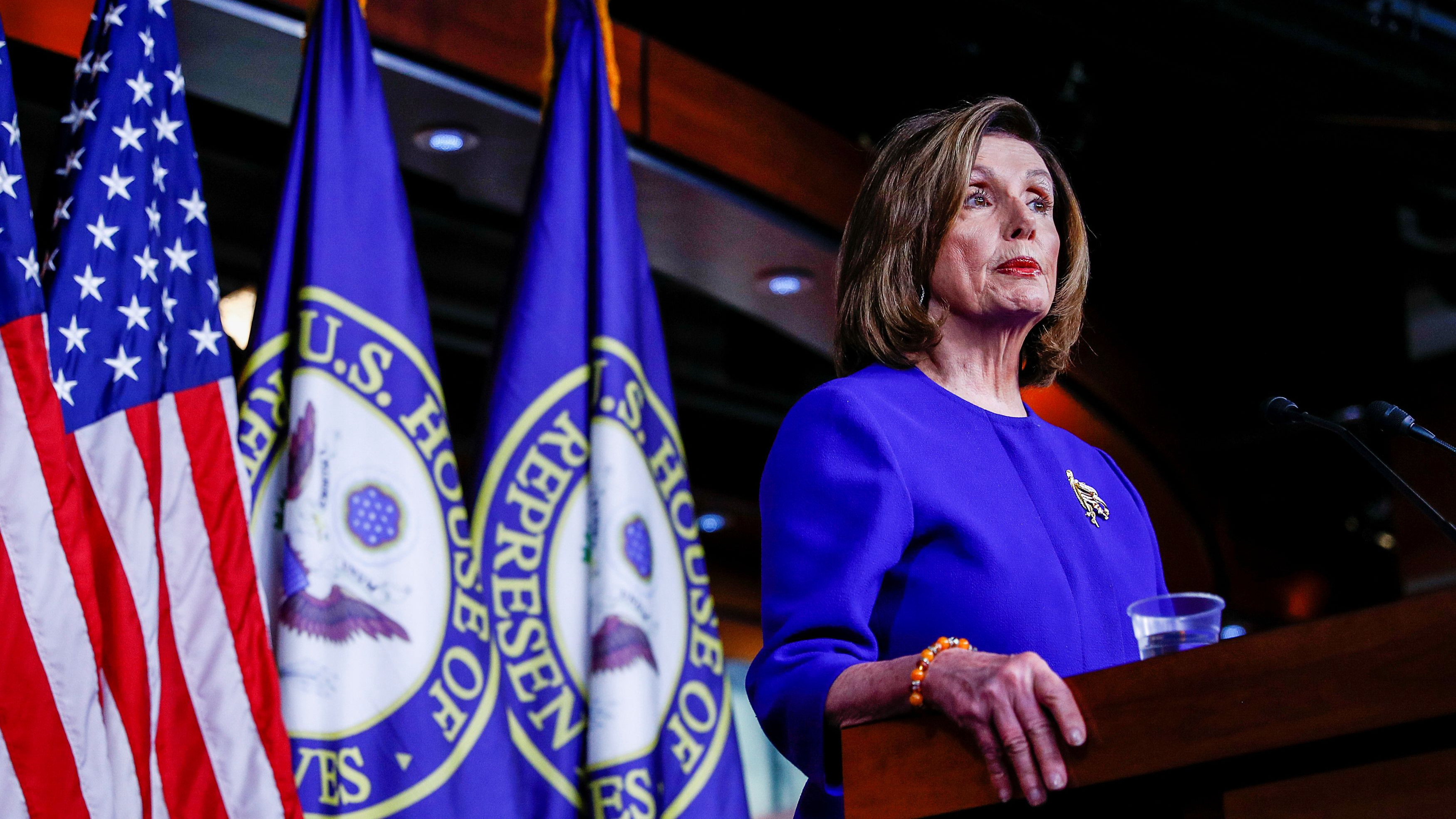
U.S. Speaker of the House Nancy Pelosi (D-CA) speaks as she addresses her weekly news conference at the U.S. Capitol, Washington, U.S., January 9, 2020. /Reuters Photo
U.S. Speaker of the House Nancy Pelosi (D-CA) speaks as she addresses her weekly news conference at the U.S. Capitol, Washington, U.S., January 9, 2020. /Reuters Photo
The intention: Drifting away from Trump's withdrawal policy
The order of killing Soleimani, according to Trump, was aimed at deterring future attacks and making the Middle East safer, but the action seems to go against Trump's long-proposed withdrawal policy and has brought the U.S. to the brink of war.
It is well-known that Trump wants to end the U.S. military presence in the Middle East from day one of his inauguration. Seeing foreign deployments as pointless and costly exercises, Trump insisted on withdrawing troops and has been doing so in Syria and Afghanistan.
But Trump's tone changed after Iraqi Prime Minister Abdul Mahdi requested a U.S. troop withdrawal following the resolution passed by its parliament. "You have to pay us for the money we put in… Otherwise, we'll stay there," said Trump in an interview with Fox.
Separately, the State Department said Pompeo had discussed Iran with Canadian Foreign Minister Francois-Philippe Champagne as well as "the opportunity for an expanded NATO force in Iraq and appropriate burden sharing," signaling an increase of presence, rather than a fading trend.
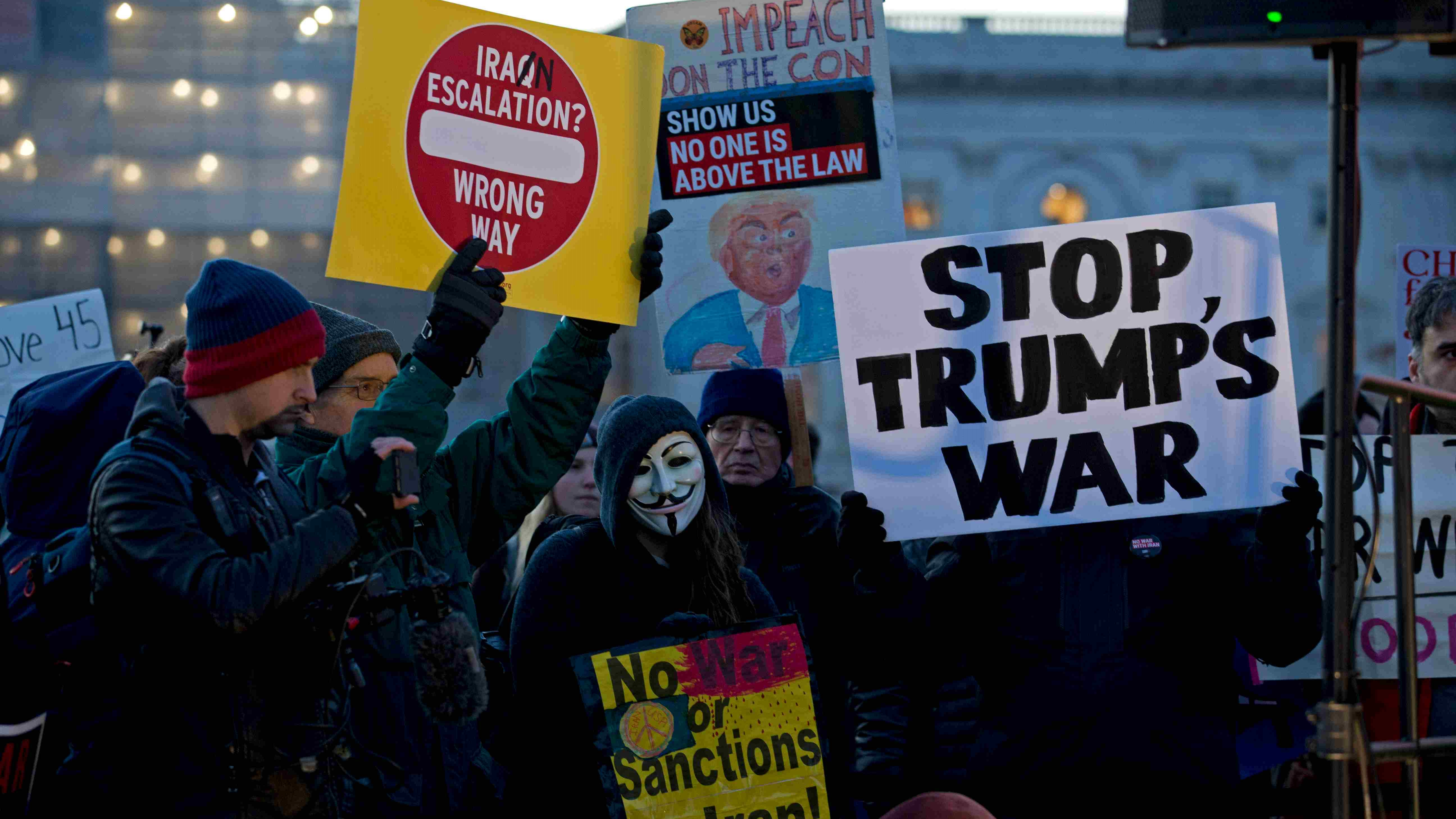
Demonstrators protest outside the U.S. Capitol during a vote on limiting President Donald Trump's ability to take military action against Iran, in Capitol Hill, Washington, DC, January 9, 2020. /AP Photo
Demonstrators protest outside the U.S. Capitol during a vote on limiting President Donald Trump's ability to take military action against Iran, in Capitol Hill, Washington, DC, January 9, 2020. /AP Photo
The timing of the killing was also unexpected, as the U.S. has been relatively restrained toward Iran when the latter seized oil tankers in the Sea of Oman, shot down U.S. drones and was accused of being involved in an attack on Saudi oil facilities.
Such inconsistency also shocked most of the U.S. allies, who found the killing untenable.
"We will not lament his death," said British Prime Minister Boris Johnson said after an emergency meeting held by NATO alliance. "It is clear, however, that all calls for retaliation or reprisals will simply lead to more violence in the region, and they are in no one's interest. We are in close contact with all sides to encourage de-escalation."
In response to doubts that Trump's move may be made to deter Iran, retired Army Lieutenant Colonel Daniel Davis said that "U.S actions have made an already volatile situation much more dangerous" and would only achieve the opposite effect, as Iranians "will never buckle to that kind of pressure."
Experts tried to explain Trump's sudden move from domestic politics and suggested that it could be an attempt to divert public attention from his impeachment to sustain his presidency.
The assumption is partly reasonable since Bill Clinton did something similar by ordering cruise missile strikes on al-Qaeda when he was facing the Monica Lewinsky scandal. For Trump, the tactic seems to have had a mixed effect, as it gives the Democrats another chance to accuse him of abuse of power.
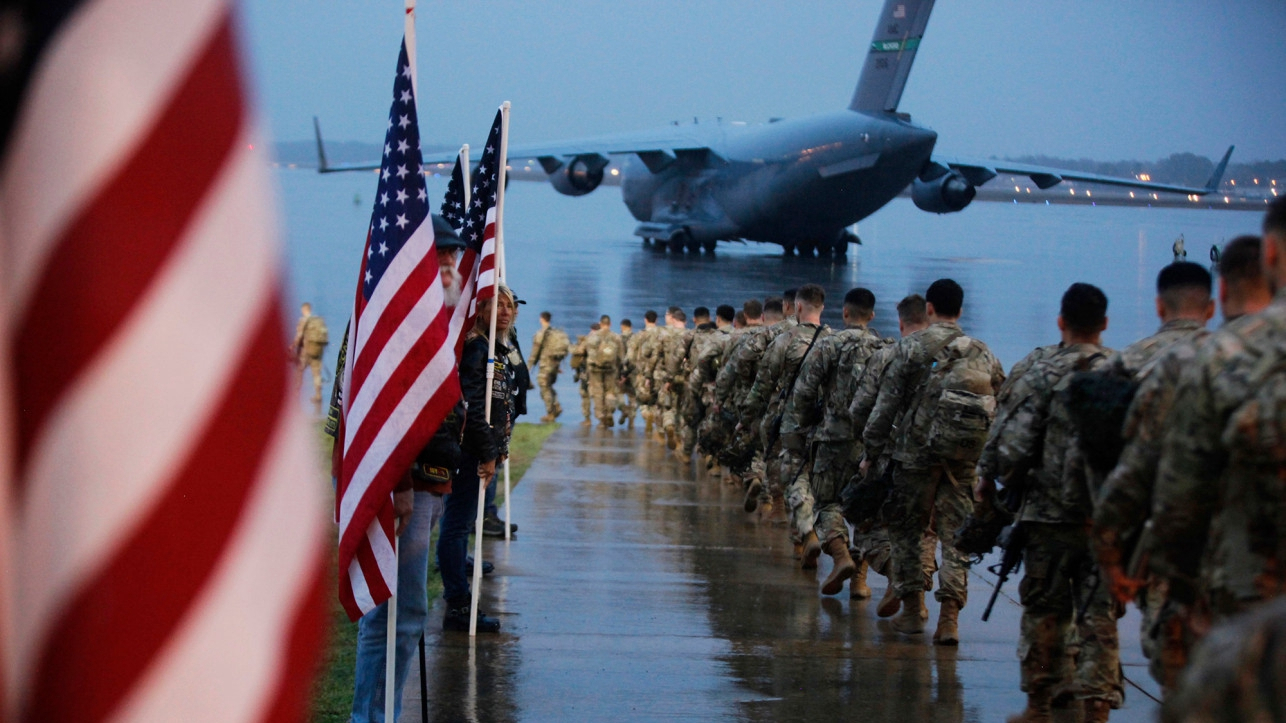
U.S. Army paratroopers prepare to load an airplane bound for Kuwait. /AP Photo
U.S. Army paratroopers prepare to load an airplane bound for Kuwait. /AP Photo
What's next?
Social media was abuzz with World War III posts during the first few days after the attack. Meanwhile, Trump's "all is well" tweet, and his decision to impose new sanctions against Iran to some degree has temporarily cooled the tensions between the U.S. and Iran.
The diplomatic response from Trump signals the U.S.' decision not to prolong the conflict,, and Iran's statement of being open to talks also leaves space for negotiations and de-escalation.
Elizabeth Drew, a Washington-based journalist and the author of Reporting Watergate and Richard Nixon's Downfall, held a relatively optimistic view. She believes Iran has no intention to start an "all-out war," as its carefully targeted retaliation, which caused zero casualties, is more prone to be a gesture.
"Iranian leaders were shrewder than Trump… They would lose a war with the U.S.," Drew said.
Nevertheless, the turbulence caused by the targeted killing seems to be just a beginning. It is possible that the current tranquility is merely the lull before the storm.
Read more:
White House correspondent analysis on Trump's Iran speech
The upsurge of U.S.-Iran conflict: What does it mean for the region?